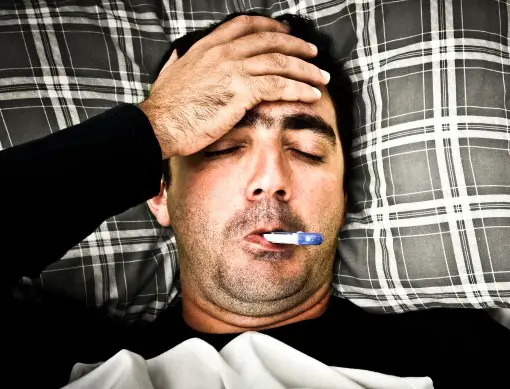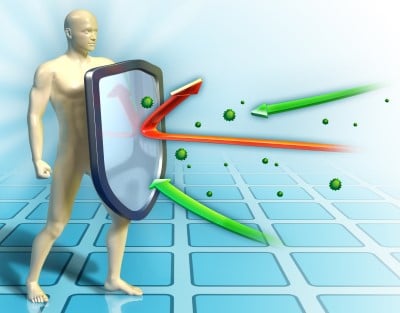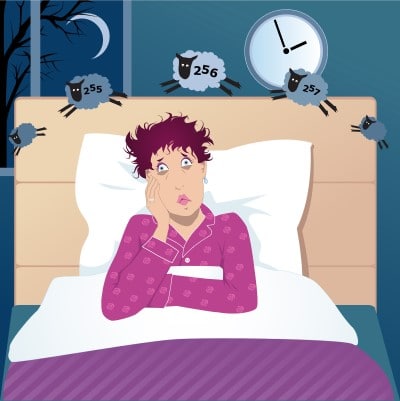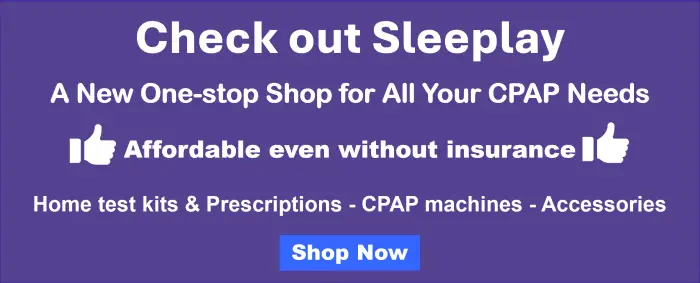
Coronavirus and sleep apnea – 3 things you should be doing
By Jason Wooden, PhD | March 21, 2020
In this article we’ll talk about:
- The link between sleep apnea and the immune system
- Why it’s important to keep your CPAP setup clean
- What stressing out too much over coronavirus can do to your immune system
- What to do if cold or flu symptoms interferes with your CPAP
With all craziness with coronavirus these days, it’s important not to overlook the importance of keeping your sleep apnea under control.
There’s already been a lot talk about washing hands and social distancing, so I won’t say anything more about that.
What’s not being widely talked about is the link between sleep and the immune system.
With corona virus, the flu, and seasonal colds, its important to do everything you can to keep your immune system in top fighting form.
It’s long been known that poor sleep can make you more susceptible to colds and the flu.
And if you’re suffering from sleep apnea, you may be unknowingly putting yourself more at risk for coronavirus and other things if your symptoms aren’t under control.
That’s why it’s important you stay consistent with your sleep apnea treatment so you can get adequate sleep everynight.
And there are other things you should be doing too.
Let’s take a look at what you should be doing to keep your sleep on track and stay healthy.

Keep your sleep apnea under control to help your immune system stay in fighting form
Sleep is important for keeping your immune system running efficiently.
Did you know that the human immune system and sleep are interconnected? It’s long been known that sleep deprivation can make people more susceptible to infectious agents.
If you don’t get enough rest, you make fewer cytokines which are important biochemicals the immune system uses to target infections.
What this all means is that if your sleep apnea is not under control, you’re sleep deprived, feeling miserable, AND likely putting yourself MORE at risk for coronavirus.
That can make a bad situation worse.
That means you have to stick to your sleep apnea therapy whether it’s CPAP or something else you’re doing.
If your sleep apnea isn’t currently under control, is it because you tried CPAP and gave up? Well, there’re plenty of alternative treatments you can now try.
Are you strapped for cash and can’t afford a CPAP machine?
There’s plenty you can do on the cheap to improve your symptoms.
Free CPAP equipment:
Used CPAP machine:
Online you’ll find companies that offer lower cost reconditioned CPAP machines. The reconditioning process for most involve cleaning, calibrating, and testing. In some cases, they may have lightly used or new open box units for sale.
Sleep position:
Depending on the severity of your sleep apnea, sleeping on your side instead of your back may help keep your throat more open and improve symptoms. Some people even claim that sleeping upright in a recliner helps.
Lifestyle changes:
Avoid substances like alcohol that may relax your throat muscles too much or smoking which can have harmful effects on the lungs. Both can aggravate sleep apnea symptoms.
Exercise:
Besides helping with weight loss, exercise is known to promote deeper sleep and there’s evidence it can help reduce sleep apnea breathing disruptions.
Weightloss:
About half of people with sleep apnea are overweight, even a small amount of weight loss can help improve symptoms.
Finally, don’t forget about sleep hygiene, the everyday things you do that can set the stage for restful nights.
Bad sleep hygiene can undercut the benefits of your sleep apnea treatment.
Even if coronavirus has caused changes to your daily routine and you’re spending more time at home than usual, it’s still important to stick to your normal wake up and bed times.
Sleep hygiene tips
- Keep consistent wake up and sleep times
- Avoid naps
- Exercise during the day
- Avoid large meals, alcohol, or stimulants such as caffeine before bedtime
- Maintain a bedtime routine to wind down
- Avoid using TVs, laptops, or other electronics before sleep
- Keep your sleep environment dark, cool, quiet, and relaxing

Keep your CPAP setup squeaky clean
You’ve probably already been told this, but it’s worth mentioning again.
The warm moist environment in a typical CPAP setup is the perfect breeding ground for bacteria and other germs.
An unhealthy germy CPAP machine can increase your risk for sinus infections and pneumonia.
None of this is good if your goal is to stay healthy and avoid complications from the flu and things like coronavirus.
Just how germy can a CPAP setup get?
Well, years ago, researchers at Brigham and Women’s Hospital tested the CPAP masks of 24 sleep apnea patients for bacteria and mold. Many of the masks were found to have high amounts of bacterial growth.
You can see why it’s important that you’re cleaning your CPAP setup on a regular basis.
Also, be sure to keep it away from people who could cough or sneeze on it.
CPAP cleaning tips:
- Clean your mask, tubing, and water chamber every day or at least on a weekly basis
- If sick, you may want to clean it more frequently
- Use a mild soap for cleanings
- Rinse with clean water
- Allow to air dry
- Check manufacturer’s recommendations to see how CPAP filters should be cleaned

Avoid stressing out too much over coronavirus
It’s understandable if you’re worried about what’s happening with coronavirus, but over stressing yourself can actually work against you keeping your sleep on track and staying healthy.
Stress is bad for sleep. It can actually make it harder to fall asleep and return to sleep if you wake up during the night.
Did you know ongoing stress is also bad for your immune system too?
The link between stress and infections has been known since the 1960s. Chronic stress can increase your risk for a cold or the flu.
That’s why it’s no surprise that the CDC includes managing your stress with their flu prevention tips.
And there’s plenty you can do to for stress:
- Focus on the things you control
- Take it one day at a time
- Keep your sense of humor
- Get adequate sleep
- Physical activity such as a walk
- Relaxation exercises such as yoga, meditation, and deep breathing
- Connect with others
- Work in a garden
- Relaxing music
- Play with a pet
- Take a long bath
- Watch a fun movie
What to do if cold or flu symptoms make it hard to use your CPAP machine
If you’re experiencing cold or flu symptoms, you should for sure see a doctor, especially if you have coronavirus symptoms.
According to the CDC, these symptoms may appear 2-14 days after exposure:
- Fever
- Cough
- Shortness of breath
It’s also important to do what you can so you can stick with your sleep apnea treatment and get the rest you need to recover.
Cold and flu symptoms can make it harder to use your CPAP machine.
A runny and congested nose can make it harder to breathe, especially if you’re using a nasal mask…
The air blowing from your CPAP machine can irritate an already inflamed sore throat…
If you’re not careful, you can get in a downward spiral where your symptoms interfere with your CPAP therapy and your CPAP worsens your symptoms.
Here’s what you can do:
Sore throat
Change position – Try sleeping on your side, lying on your back can worsen the accumulation of excessive mucous in throat.
Drink water – Staying extra hydrated may help get rid of excess mucus in your airways.
Honey – Taking 1 to 2 teaspoons of honey at bedtime is a simple natural remedy that might help with your cough.
Cough suppressants – These meds work by blocking the cough reflex. They include cough syrup or throat lozenges.
Expectorants – These cold meds loosen mucus so that its easier to cough up.
Combination cold medications – These meds contain a suppressant or expectorant with other ingredients to treat cold symptoms such as a decongestant and pain reliever.
Stuffy nose
Change your sleep position – Propping your head up with an extra pillow can help the nasal passage to drain. Sleeping on your side instead of your back may also help clear your nose.
Saline spray – Available in drops or a spray, these salt-water solutions can help loosen up mucus, relieve swelling, and help you breathe easier. The effects may be short-lived.
Nasal Strips – Made of flexible bands with a sticky adhesive, nasal strips such as Breathe Right lift the side of the nose to open nasal passages. The lifting action can help relieve inflamed passages and make it easier to breathe.
Decongestants – Available as a pill, liquid, or nasal spray, these meds reduce swelling of blood vessels in your nose which helps to open airways.
Combination cold medications – Many meds for cold and flu symptoms such as Theraflu contain ingredients to help relieve nasal congestion.
Switch to a full-face CPAP mask – If you’re having a hard time using a nasal mask, you may want to try temporarily using a full-face mask.
CPAP with heated humidifier – Humidifying the air in your room can help calm irritated tissues in your nose and sinuses. Most CPAP machines now can humidify and warm air, so ask your doctor about making adjustments.
Headaches
Warm compress – Placing a warm compress or wash cloth on your forehead and nose can help relieve sinus pressure and other head cold symptoms.
Stay hydrated – Drink plenty of warm fluids, it can help clear out the mucus and drain nasal passages.
Decongestants – They help reduce swelling and congestion which can help with the pain and pressure in your sinuses and head.
Pain relievers – Acetaminophen-based meds such as Tylenol work against the area of your brain that receive pain signals. Non-steroidal anti-inflammatory drugs (NSAIDs) work by reducing the amount a hormone involved with inflammation and pain.
Sources:
1. Human immune system during sleep, Am J Clin Exp Immunol. 2017; 6(6): 92–96.
2. G?s-coupled receptor signaling and sleep regulate integrin activation of human antigen-specific T cells, J Exp Med (2019) 216 (3): 517–526.
3. “How Sleep Affects Your Immunity”, National Sleep Foundation website
4. CPAP Masks are Sources of Microbial Contamination
5. “Reduce Stress if You Want to Reduce Flu Risk”, 2016, American Council on Science and Health website
6. Current Directions in Stress and Human Immune Function,
7. “What Happens When Your Immune System Gets Stressed Out?”, Cleveland Clinic website
Connect with us:
About Us
Better Sleep Simplified® was founded as a place for you to get clear and well-researched information.
Our goal is to make sure you know about your options so that you take action sooner rather than later.
Check us out on YouTube:
Watch and Learn
Helpful sleep tips, interesting sleep facts and statistics you want to know about
Affiliate Disclosure
This site is a participant in the Amazon Services LLC Associates Program and other affiliate advertising programs designed to provide a means for sites to earn advertising fees by advertising and linking to them.
Important: BetterSleepSimplified.com is for informational purposes only and is not intended or implied to be a substitute for professional medical advice, diagnosis, or treatment. Always consult a physician for sleep and health concerns. See additional information.


